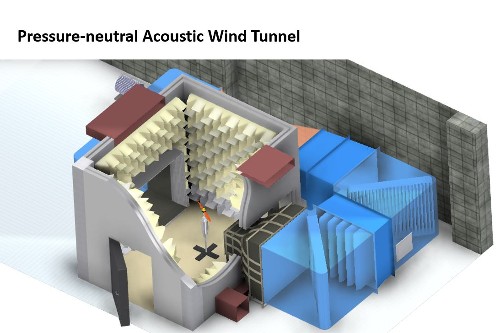
Pressure-neutral Acoustic Wind Tunnel
The University of Bristol's pioneering wind tunnel facilities have been awarded a portion of UK Research and Innovation's £23 million, to transform UK research capability in fluid dynamics.
The funds will be invested into three major facilities, the National Boundary Layer Wind Tunnel, the Pressure Neutral Acoustic Wind Tunnel (PNWT) and the National Propeller testbed (NPTB).
The National Boundary Layer Wind Tunnel is a multi-purpose facility with an 18m long test section, suitable for fundamental wall-bounded turbulence research, low-drag surfaces, air quality research, aeroacoustics, environmental aerodynamics and general aerodynamics.
The PNWT is a dedicated aeroacoustic wind tunnel facility, designed for aerodynamic and aeroacoustic testing of propellers at different operating conditions. The facility will be equipped with microphone arrays and flow measurement equipment.
The NPTB facility, once built, will be a large and highly instrumented propeller test rig, which will improve the UK's capability in rotorcraft research. This facility will enable the UK researchers to perform detailed aerodynamic and aeroacoustic tests of rotors at different operating conditions.
Prof Mahdi Azarpeyvand of Bristol's Department of Aerospace Engineering leads the wind tunnel research. He said: "This is fantastic news for Bristol.
"The Faculty of Engineering at the University of Bristol hosts some of the greatest and most unique wind tunnel facilities in the country.
"This funding is an investment in our future. It will allow us not only to test the very latest in aviation technologies, but could transform our understanding in sectors as important as air quality, aeroacoustics and turbulence.
"Thank you to UKRI for helping us to make the world a safer, greener place."
UKRI is investing in 11 individual wind tunnels, an experimental database and upgrades to existing facilities, totalling £23 million, to transform UK research capability in fluid dynamics.
The National Wind Tunnel Facility+ (NWTF+) will deliver a network of world-leading wind tunnels. It will address societal and industrial grand challenges including the generation of net zero technologies; advances in emissions reduction; and future technologies for transport, energy, and healthcare.
The UKRI today announced a total of £72 million investment in new infrastructure projects.
Science and Technology Secretary, Chloe Smith, said: "World-class facilities and equipment are at the root of cutting-edge research and our £72m investment will further accelerate innovation in astronomy, aviation, medicine and beyond.
"By working with our private sector partners and investing a record £20bn in R&D by 2025, we are making Britain a scientific superpower and creating the jobs which are so vital to growing our economy, boosting our productivity, and bringing prosperity to British people.'
Executive Chair of the Science and Technology Facilities Council and UKRI Champion for Infrastructure, Professor Mark Thomson, said: "Scientists working on research from life sciences to aircraft safety depend on access to the most advanced equipment and facilities.
"This £72 million investment in the UK's research and innovation infrastructure will ensure the UK is at the forefront of scientific discovery. It will support our scientists in responding to major global challenges including net zero and food security.
"Five years on from the publication of UKRI's Infrastructure Roadmap, this shows how we are taking a strategic approach to identifying the facilities the UK needs and how to support them."
The National Wind Tunnel Facility+ is made up of a hub: Imperial College London; nodes: University of Bristol, University of Birmingham, City, University of London, Cranfield University, University of Cambridge, University of Glasgow, Imperial College London, University of Manchester, University of Loughborough, University of Oxford, University of Southampton and University of Surrey.






